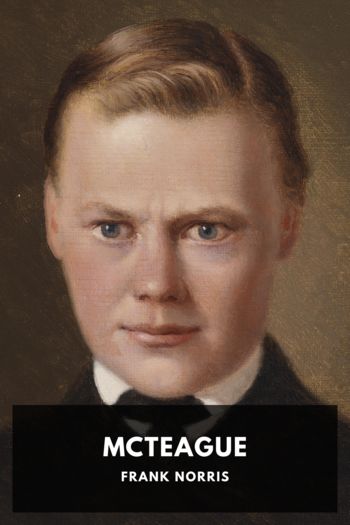McTeague - Frank Norris (great reads TXT) 📗

- Author: Frank Norris
Book online «McTeague - Frank Norris (great reads TXT) 📗». Author Frank Norris
But for one thing, McTeague would have been perfectly contented. Just outside his window was his signboard—a modest affair—that read: “Doctor McTeague. Dental Parlors. Gas Given”; but that was all. It was his ambition, his dream, to have projecting from that corner window a huge gilded tooth, a molar with enormous prongs, something gorgeous and attractive. He would have it some day, on that he was resolved; but as yet such a thing was far beyond his means.
When he had finished the last of his beer, McTeague slowly wiped his lips and huge yellow mustache with the side of his hand. Bull-like, he heaved himself laboriously up, and, going to the window, stood looking down into the street.
The street never failed to interest him. It was one of those cross streets peculiar to Western cities, situated in the heart of the residence quarter, but occupied by small tradespeople who lived in the rooms above their shops. There were corner drug stores with huge jars of red, yellow, and green liquids in their windows, very brave and gay; stationers’ stores, where illustrated weeklies were tacked upon bulletin boards; barber shops with cigar stands in their vestibules; sad-looking plumbers’ offices; cheap restaurants, in whose windows one saw piles of unopened oysters weighted down by cubes of ice, and china pigs and cows knee deep in layers of white beans. At one end of the street McTeague could see the huge powerhouse of the cable line. Immediately opposite him was a great market; while farther on, over the chimney stacks of the intervening houses, the glass roof of some huge public baths glittered like crystal in the afternoon sun. Underneath him the branch post-office was opening its doors, as was its custom between two and three o’clock on Sunday afternoons. An acrid odor of ink rose upward to him. Occasionally a cable car passed, trundling heavily, with a strident whirring of jostled glass windows.
On week days the street was very lively. It woke to its work about seven o’clock, at the time when the newsboys made their appearance together with the day laborers. The laborers went trudging past in a straggling file—plumbers’ apprentices, their pockets stuffed with sections of lead pipe, tweezers, and pliers; carpenters, carrying nothing but their little pasteboard lunch baskets painted to imitate leather; gangs of street workers, their overalls soiled with yellow clay, their picks and long-handled shovels over their shoulders; plasterers, spotted with lime from head to foot. This little army of workers, tramping steadily in one direction, met and mingled with other toilers of a different description—conductors and “swing men” of the cable company going on duty; heavy-eyed night clerks from the drug stores on their way home to sleep; roundsmen returning to the precinct police station to make their night report, and Chinese market gardeners teetering past under their heavy baskets. The cable cars began to fill up; all along the street could be seen the shopkeepers taking down their shutters.
Between seven and eight the street breakfasted. Now and then a waiter from one of the cheap restaurants crossed from one sidewalk to the other, balancing on one palm a tray covered with a napkin. Everywhere was the smell of coffee and of frying steaks. A little later, following in the path of the day laborers, came the clerks and shop girls, dressed with a certain cheap smartness, always in a hurry, glancing apprehensively at the powerhouse clock. Their employers followed an hour or so later—on the cable cars for the most part whiskered gentlemen with huge stomachs, reading the morning papers with great gravity; bank cashiers and insurance clerks with flowers in their buttonholes.
At the same time the school children invaded the street, filling the air with a clamor of shrill voices, stopping at the stationers’ shops, or idling a moment in the doorways of the candy stores. For over half an hour they held possession of the sidewalks, then suddenly disappeared, leaving behind one or two stragglers who hurried along with great strides of their little thin legs, very anxious and preoccupied.
Towards eleven o’clock the ladies from the great avenue a block above Polk Street made their appearance, promenading the sidewalks leisurely, deliberately. They were at their morning’s marketing. They were handsome women, beautifully dressed. They knew by name their butchers and grocers and vegetable men. From his window McTeague saw them in front of the stalls, gloved and veiled and daintily shod, the subservient provision men at their elbows, scribbling hastily in the order books. They all seemed to know one another, these grand ladies from the fashionable avenue. Meetings took place here and there; a conversation was begun; others arrived; groups were formed; little impromptu receptions were held before the chopping blocks of butchers’ stalls, or on the sidewalk, around boxes





Comments (0)